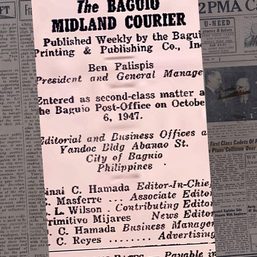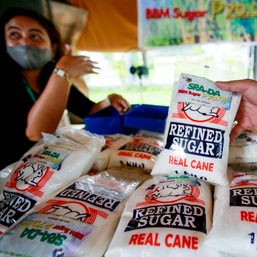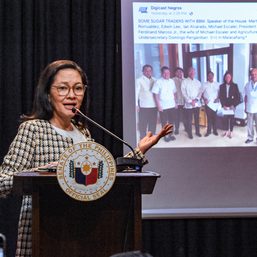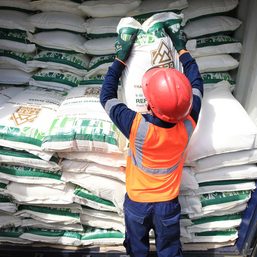SUMMARY
This is AI generated summarization, which may have errors. For context, always refer to the full article.
![[Vantage Point] The transformation of sugar barons](https://www.rappler.com/tachyon/2022/08/tl-sugar-barons.png)
During the 16th Congress on February 18, 2016, the Senate issued an official press release headlined: “Sugar barons sweeten Sen. [Ferdinand] Marcos’ [Jr.] VP bid.”
The official communications released to media that day was about Marcos Jr. joining the leaders of the country’s industry in a dinner at the Manila Polo Club where he outlined his platform of government, specifically with respect to agriculture and the sugar industry, in particular.
“I would like to be very active in all agriculture,” Marcos Jr. announced at the dinner. “Let us just say that I would work very hard for agriculture in general, and the sugar industry in particular.”
The press release also narrated that “the country’s sugar barons were throwing their support behind the vice presidential bid of Marcos Jr.”
Among those present in the dinner were Confederation of Sugar Producers Association (CONFED) Negros-Panay Chapter president Francis dela Rama, National Federation of Sugarcane Planters (NFSP) president Enrique Roxas, PANAYFED (Panay Federation of Sugarcane Planters) president Danilo Abelita, and UNIFED (United Sugar Producers Federation of the Philippines) president Manuel Lamata, as well as several other leaders of various sugar planters’ association.
After hearing the former senator’s stand on issues affecting the sugar industry, Dela Rama asked his fellow sugar producers, “Well, gentlemen, are we for it?” The question was met with a unanimous “yes.”
Now that Marcos Jr. is president, various business leaders whom Rappler has spoken with could not help but recall how the industry became the darling of Ferdinand Marcos during his deadly dictatorial rule under Martial Law. During his reign (1965-1986), select businesses were chosen, coddled, and blessed with financial support, sole benefaction, tax exemptions, and dominion over entire industries rendering these businesses as monopolies.
I find it really eerie that Marcos Jr. is now taking a similar stance toward an industry which for the longest time, despite being defanged by agrarian reform, has been getting preferential treatment from the government.
The industry was a monopoly during Martial Law. A series of unfortunate events, however, have soured for the industry. Its boom ended in 1974, the preferential trade agreement the Philippines had with the US expired, and exports steadily dropped since then. Today, the Philippines – which used to be one of the world’s top sugar exporters – has turned into a sugar importer. One of the reasons the industry struggles to be competitive, an industry insider told Rappler, is that “some planters would rather splurge on luxurious items than invest on productivity enhancing measures, like machinery, irrigation, or fertilizers.”
Despite the fall, sugar barons have not shed their swagger and penchant for luxurious lifestyle: “The only thing that has changed for sugar barons,” the industry source remarked, “is they no longer possess huge tracts of sugar plantations due to land reform.”
I should note however that while land reform forced these barons to give up five hectares each to their respective farmer-beneficiaries, large swathes of their farm holdings were reclassified as industrial/commercial areas, helping them avoid land reform distribution.
Our source says that, while some barons have become sugar traders who now control sugar prices, farmer-beneficiaries themselves have consolidated into a formidable lobby group with some of them engaging in price speculation which affect sugar prices. The quedan system makes it easy for planters to engage in speculative trading. Quedan is a negotiable instrument backed up by the value of sugar in stock – typically in specific warehouse (usually at a sugar mill). The Sugar Regulatory Authority (SRA) allows the quedan to be used as a transferable note.
The other factor affecting sugar prices is the system of hauling harvested crops from the farmlands to the millers. In the past, farm yields were transported by train (the bagon system) to the millers. Enterprising planters, however, went into the trucking business and began charging millers per haul. Trucking rates vary, with millers trying to outdo each other by luring planters into their mills. Price per haul hovers between P300 and P500 per metric ton, depending on fuel prices. Hauling costs represent about 30% to 50% of milling cost, which millers then pass on to consumers.
The sugarcane planters’ association initiated a weekly bidding process for raw sugar, using the result of the bidding in Negros – which is normally done on a Thursday – as the reference price for sugar that is made available to other planters’ associations nationwide. Negros accounts for 51% of sugarcane areas in the country, followed by Mindanao, 20%; Luzon, 17%; Panay, 7%; and Eastern Visayas, 4%. The decision then lies upon the sugar trader to charge buyers of the commodity, using the same reference price or sell at a higher or lower price.
When the price of sugar drops in relation to faster-growing, more profitable crops, it is no wonder that some farmers will stop planting sugarcane and do so when prices soar. Their projected income is computed in terms of mill site prices using sugar yield (LKG/TC) and the prevailing sharing scheme implemented in the mill district (i.e., 70% of sugar output to the farmer and 30% to the miller).
This sharing scheme is among what the National Economic and Development Authority (NEDA) wants eliminated in favor of the cane purchase system which is practiced worldwide. Under the cane purchase system, which I explained in my last column, the miller pays the planters for all cane delivered, at prices depending on cane quality. The cane purchase system allows the miller to procure full ownership of processed output. Still another alternative is toll milling, where the planter pays the miller a service fee while maintaining ownership of the cane and the product(s) derived from it. The sharing system implies shared ownership over the milled sugar, which introduces considerable disincentives on both sides of the transaction.
While there are some people who will say that the Philippines no longer has sugar barons, perhaps after reading historical industry accounts on Google or Wikipedia, the term “sugar barons” remains to mean “people who made their fortune from sugar.” What decades have not erased however is the negative impact of protectionism on the Philippine economy.
Protectionism has been the bane of our country’s economic development. The entrenched elite in agriculture and industry are not only experts in seeking added wealth without any reciprocal contribution. They use their connections in government to enjoy protectionist favors that burden consumers.
The NEDA identified the ultimate reason for the industry’s decline as its historical insulation from the international market. In a study, the NEDA observed: “While the shielded high domestic price of sugar has helped support the sugar industry, domestic sugarcane production has not achieved higher productivity; nor has the industry as a whole become more competitive over time. On the other hand, it has increased the cost of sugar for consumers and for food and beverage manufacturers, in turn undermining the competitiveness of the latter.”
With about 700,000 Filipinos directly engaged in sugar production and between 5 million and 6 million indirectly employed in the industry, Marcos Jr., should strive to shake up the status quo and invite stakeholders and experts in crafting new approaches in solving the issues of corruption, low productivity, climate change, outdated or poorly crafted policies, and other challenges that dent the industry’s image as a question mark in the global market.
Albay 2nd district Representative Joey Salceda favors the abolition of the Sugar Regulatory Administration (SRA), describing it is a failed agency. “In its current form, the SRA must change or be abolished. It has not been very effective in its role of local industry development. Low utilization rates of SIDA and TRAIN Law funds have hounded that agency. Senator Cynthia Villar for her part is pushing a legislative fiat on the proposed abolition of the SRA.
Former president Rodrigo Duterte himself vowed to abolish the SRA because of corruption. The people and the business sector are awaiting Marcos Jr.’s Solomonic decision. – Rappler.com
Val A. Villanueva is a veteran business journalist. He was a former business editor of the Philippine Star and the Gokongwei-owned Manila Times. For comments, suggestions email him at mvala.v@gmail.com.
Add a comment
How does this make you feel?
![[Vantage Point] The bitter taste of sugar](https://www.rappler.com/tachyon/2022/08/Vantage-Point-bitter-taste-sugar-August-23-2022.jpg?fit=449%2C449)
![[Closer Look] ‘Join Marcos, avert Duterte’ and the danger of expediency](https://www.rappler.com/tachyon/2024/06/TL-trillanes-duterte-expediency-june-29-2024.jpg?resize=257%2C257&crop_strategy=attention)

![[Newspoint] A Freedom Week joke](https://www.rappler.com/tachyon/2024/06/20240614-Filipino-Week-joke-1.jpg?resize=257%2C257&crop_strategy=attention)


![[In This Economy] Marcos’ POGO ban is popular, but will it work?](https://www.rappler.com/tachyon/2024/07/thought-leaders-marcos-pogo-ban.jpg?resize=257%2C257&crop=255px%2C0px%2C720px%2C720px)
![[Rappler Investigates] POGOs no-go as Typhoon Carina exits](https://www.rappler.com/tachyon/2024/07/newsletter-graphics-carina-pogo.jpg?resize=257%2C257&crop=424px%2C0px%2C1080px%2C1080px)




![[Vantage Point] Sugar mess gets messier (Part 2)](https://www.rappler.com/tachyon/2023/04/Sugar-mess-April-1-2023-f.jpg?resize=257%2C257&crop=304px%2C0px%2C720px%2C720px)


![[Vantage Point] Sugar mess gets messier](https://www.rappler.com/tachyon/2023/03/sugar-smuggling-march-21-2023.jpg?resize=257%2C257&crop=378px%2C0px%2C1080px%2C1080px)
![[OPINION] Raised on radio](https://www.rappler.com/tachyon/2024/04/raised-on-radio.jpg?resize=257%2C257&crop=396px%2C0px%2C720px%2C720px)
![[Just Saying] Marcos: A flat response, a missed opportunity](https://www.rappler.com/tachyon/2024/04/tl-marcos-flat-response-april-16-2024.jpg?resize=257%2C257&crop=277px%2C0px%2C720px%2C720px)












There are no comments yet. Add your comment to start the conversation.